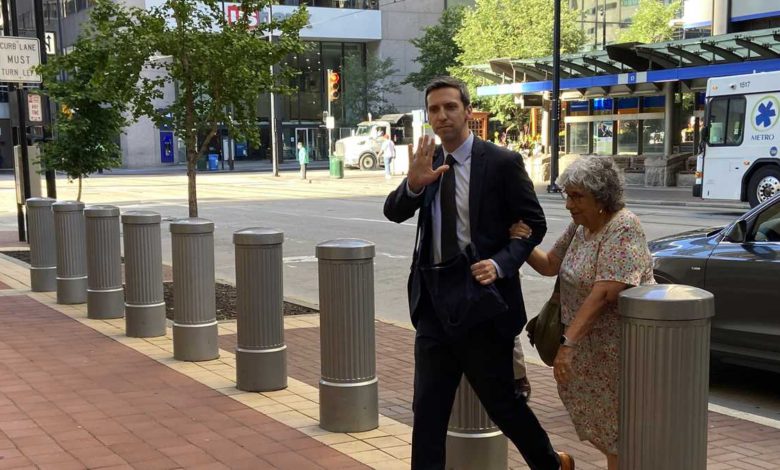
Former council member P.G. Sittenfeld has been found guilty on one count of bribery and one count of attempted extortion.The split verdict came Friday after a three week trial and 12 to 13 hours of jury deliberation. He was found not guilty on two counts of honest services wire fraud, one count of bribery and one count of attempted extortion. Sittenfeld walked into the courtroom, kissed his wife on the head and stood at the defense table.The former council member lowered his head when the verdict was read. He walked out of the courthouse with his wife and did not provide any comment. It's unclear when his sentencing will take place.Sittenfeld was on trial, accused of accepting $40,000 in campaign donations in exchange for his support of a development, the 435 Elm Street project. The investigation began in 2018 and Sittenfeld was indicted in November 2020. He turned down a plea that would’ve capped prison term at 2 months and allowed him to argue for probation.The original 16 jurors were from five different counties: Hamilton, Butler, Warren, Clermont and Brown counties. Two jurors were replaced by alternates during the trial. Former council member Steve Goodin was at the courthouse, saying the jury's verdict sent a clear message. "As I read the verdict, the jury did not like some of the shenanigans of the FBI agents and they seemed to have acquitted primarily on the counts that involved solely of the FBI sting operation. But they also took a very dim view as I think the evidence of those phone calls between Sittenfeld and Ndukwe, I think they were clearly quid pro quo type of arrangements discussed campaign finance contributions there. Mr. Sittenfeld took the stand and explained in a way as best he and all we can assume is the jury didn't find that explanation to be credible," Steve Goodin, former council member said.Previous coverage of the trial can be found below.During closing arguments, prosecutor Matthew Singer spent more than 90 minutes highlighting some of their evidence and explaining how it relates to the law.He posed what he called a "simple question" to the jury, "Did Mr. Sittenfeld agree to accept money knowing that it was in exchange for specific official action?" Singer said, "The answer is, yes."Singer replayed portions of recorded phone conversations and meetings between Sittenfeld, undercover FBI agents posing as investors and Chinedum Ndukwe.Ndukwe is a former Bengal turned developer who was secretly working for the FBI.In multiple conversations, there were discussions of developing 435 Elm followed by talk of campaign donations.Jurors, again, saw photos of all of the checks that the undercover agents had given to Sittenfeld for his PAC. They totaled $40,000.Singer made it clear to the jury that it is not a defense for Sittenfeld to claim he would have supported the project anyway,Defense attorney Charlie Rittgers posed a different question to the jury, "Did he (Sittenfeld) have corrupt intent?"Rittgers said "everything in this case comes down to intent" and argued "there was no bribe."Rittgers said the only quid pro quo is "P.G. saying there won't be one."Rittgers also reminded jurors that two of the government's witnesses had been under investigation for federal crimes.Rittgers said they "have all the incentive in the world to work with the federal government."As for Sittenfeld telling the undercover FBI agents that he could "get the votes" or "shepherd the votes" related to the 435 Elm project, Rittgers said it wasn't unusual for elected officials to say that."That is an everyday occurrence," Rittgers said.
Former council member P.G. Sittenfeld has been found guilty on one count of bribery and one count of attempted extortion.
The split verdict came Friday after a three week trial and 12 to 13 hours of jury deliberation.
He was found not guilty on two counts of honest services wire fraud, one count of bribery and one count of attempted extortion.
Sittenfeld walked into the courtroom, kissed his wife on the head and stood at the defense table.
The former council member lowered his head when the verdict was read. He walked out of the courthouse with his wife and did not provide any comment.
It's unclear when his sentencing will take place.
Sittenfeld was on trial, accused of accepting $40,000 in campaign donations in exchange for his support of a development, the 435 Elm Street project. The investigation began in 2018 and Sittenfeld was indicted in November 2020.
He turned down a plea that would’ve capped prison term at 2 months and allowed him to argue for probation.
The original 16 jurors were from five different counties: Hamilton, Butler, Warren, Clermont and Brown counties. Two jurors were replaced by alternates during the trial.
Former council member Steve Goodin was at the courthouse, saying the jury's verdict sent a clear message.
"As I read the verdict, the jury did not like some of the shenanigans of the FBI agents and they seemed to have acquitted primarily on the counts that involved solely of the FBI sting operation. But they also took a very dim view as I think the evidence of those phone calls between Sittenfeld and Ndukwe, I think they were clearly quid pro quo type of arrangements discussed campaign finance contributions there. Mr. Sittenfeld took the stand and explained in a way as best he and all we can assume is the jury didn't find that explanation to be credible," Steve Goodin, former council member said.
This content is imported from Twitter.
You may be able to find the same content in another format, or you may be able to find more information, at their web site.
Previous coverage of the trial can be found below.
During closing arguments, prosecutor Matthew Singer spent more than 90 minutes highlighting some of their evidence and explaining how it relates to the law.
He posed what he called a "simple question" to the jury, "Did Mr. Sittenfeld agree to accept money knowing that it was in exchange for specific official action?" Singer said, "The answer is, yes."
Singer replayed portions of recorded phone conversations and meetings between Sittenfeld, undercover FBI agents posing as investors and Chinedum Ndukwe.
Ndukwe is a former Bengal turned developer who was secretly working for the FBI.
In multiple conversations, there were discussions of developing 435 Elm followed by talk of campaign donations.
Jurors, again, saw photos of all of the checks that the undercover agents had given to Sittenfeld for his PAC. They totaled $40,000.
Singer made it clear to the jury that it is not a defense for Sittenfeld to claim he would have supported the project anyway,
Defense attorney Charlie Rittgers posed a different question to the jury, "Did he (Sittenfeld) have corrupt intent?"
Rittgers said "everything in this case comes down to intent" and argued "there was no bribe."
Rittgers said the only quid pro quo is "P.G. saying there won't be one."
Rittgers also reminded jurors that two of the government's witnesses had been under investigation for federal crimes.
Rittgers said they "have all the incentive in the world to work with the federal government."
As for Sittenfeld telling the undercover FBI agents that he could "get the votes" or "shepherd the votes" related to the 435 Elm project, Rittgers said it wasn't unusual for elected officials to say that.
"That is an everyday occurrence," Rittgers said.
Source link








